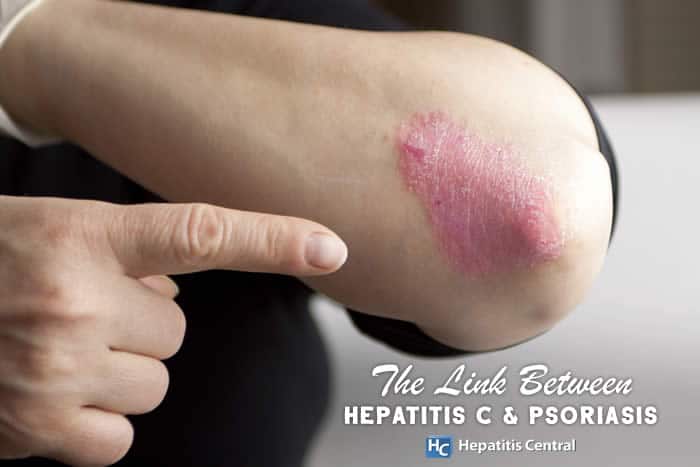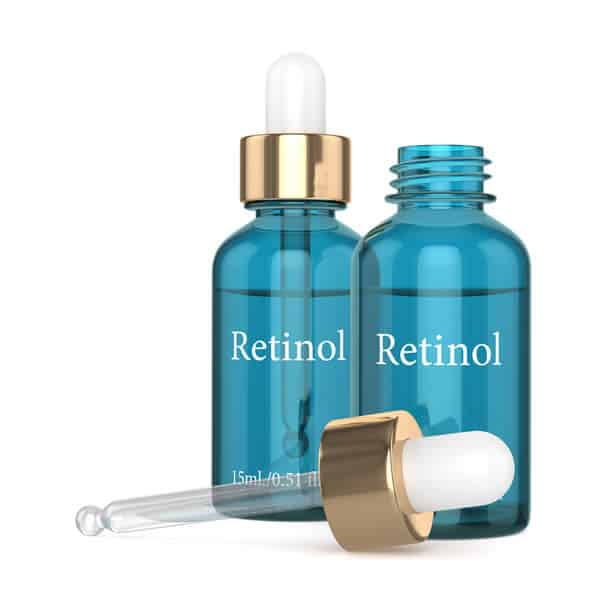The Link Between Hepatitis C & Psoriasis


Even though hepatitis C and psoriasis are two completely different conditions, they still share a connection. According to research, if you’re diagnosed with hepatitis C you may notice an onset of psoriasis. It’s also believed that if one condition gets treated (when you have both hepatitis C and psoriasis), the other one may flare up.
We’re breaking down what research says behind the connection between psoriasis and hepatitis C.
What Is Psoriasis?
Psoriasis is a condition that affects over 7.5 million U.S. adults. It’s considered an immune-mediated disease, which is a condition that creates inflammation for an unknown reason. Due to the inflammation, the skin begins to create plaques and scales that can look different depending on your skin type. (1)
The patches of psoriasis can show up on any part of your body, but they are most commonly found on:
- elbows
- knees
- and scalp.
Although the reason behind the onset of psoriasis is unknown, scientists know that the immune system and genetics play a role. When it comes to the immune system, certain events can make changes to it such as stress, illnesses, injury to the skin, and certain medications. (2)
How Hepatitis C and Psoriasis Are Connected
Just because you have hepatitis C does not mean you will get psoriasis, and vice versa. However, a 2017 study published in the Journal of the European Academy of Dermatology and Venereology (3) found that those with psoriasis had a higher rate of hepatitis C infections. In the study it was noted that the majority of the hepatitis C patients had mild psoriasis, but there were still thousands who had a moderate-severe case.
With the more severe cases, there was also an increase of hepatic decompensation (AKA worsening of the liver). This makes it important to pinpoint and treat the hepatitis C patients with severe psoriasis to prevent liver failure from occurring.
A Study in the Journal of Dermatology
A 2013 study published in the Journal of Dermatology (4) also indicated that hepatitis C preceded the onset of psoriasis in 80% of the patients studied.
Hepatitis C is known to affect the liver negatively, but it can also affect our skin. That’s because hepatitis C can create issues with our immune system which then triggers conditions such as hives, psoriasis, and other rashes.
Research has also indicated that psoriasis increases the risk of infection which can further be affected by immune-modulatory treatments (medicines that change the way the immune system works). (5) This could be someone at even more risk of contracting a hepatitis C infection.
Lastly, the body goes through a lot of stress when dealing with a hepatitis C infection and even certain medications that are used to treat the virus can wind up causing psoriasis or making it flare up.
Best Treatment Options
According to an older 2009 study (6) topical therapies are the first choice in treating psoriasis with hepatitis C.
This could include:
- Corticosteroids: A good option for mild to moderate psoriasis and can be found as ointments, creams, lotions, gels, foams, sprays, and shampoos. (7) This topical treatment fights off the inflammation and reduces the amount of collagen in the skin.
- Retinoids: This medication is a synthetic form of vitamin A and is often prescribed for individuals dealing with acne. When applied onto psoriasis patches, retinoids can slow the rapid growing skin cells, decrease scaliness, lessen redness, and reduce the thickness. (8)

In the same study, ultraviolet B phototherapy is mentioned as another treatment option. The National Psoriasis Foundation (9) states that ultraviolet light B (UVB) treatment helps to penetrate the skin and slow down the growth of the affected skin cells. You can get UVB rays from the sunshine, but it can also be administered through an artificial UVB light source.
If the psoriasis leans more to the severe end, combining both topical therapies and ultraviolet B phototherapy together can be beneficial and are safe for those with hepatitis C.
Not all treatments may work the same for everyone. Therefore it’s always best to discuss options with your healthcare provider.
The Takeaway
Although psoriasis cannot cause hepatitis C, and vice versa, there is still a connection between the two conditions. Most scientists believe that the link comes from the fact that hepatitis C affects the immune system and psoriasis is an immune-related condition.
- National Psoriasis Foundation. (n.d.). Causes, Triggers and Treatments. Psoriasis. https://www.psoriasis.org/about-psoriasis/.
- National Psoriasis Foundation. (n.d.). Causes & Triggers. Psoriasis. https://www.psoriasis.org/causes/.
- Noe, M. H., Grewal, S. K., Shin, D. B., Ogdie, A., Takeshita, J., & Gelfand, J. M. (2017). Increased prevalence of HCV and hepatic decompensation in adults with psoriasis: a population-based study in the United Kingdom. Journal of the European Academy of Dermatology and Venereology, 31(10), 1674–1680. https://doi.org/10.1111/jdv.14310
- Imafuku, S., & Nakayama, J. (2013). Profile of patients with psoriasis associated with hepatitis C virus infection. The Journal of Dermatology, 40(6), 428–433. https://doi.org/10.1111/1346-8138.12112
- Rademaker, M., Agnew, K., Anagnostou, N., Andrews, M., Armour, K., Baker, C., Foley, P., Gebauer, K., Gupta, M., Marshman, G., Rubel, D., Sullivan, J., & Wong, L. C. (2018). Psoriasis and infection. A clinical practice narrative. Australasian Journal of Dermatology, 60(2), 91–98. https://doi.org/10.1111/ajd.12895
- Frankel, A. J., Van Voorhees, A. S., Hsu, S., Korman, N. J., Lebwohl, M. G., Bebo, B. F., & Gottlieb, A. B. (2009). Treatment of psoriasis in patients with hepatitis C: From the Medical Board of the National Psoriasis Foundation. Journal of the American Academy of Dermatology, 61(6), 1044–1055. https://doi.org/10.1016/j.jaad.2009.03.044
- Mayo Foundation for Medical Education and Research. (2020, May 2). Psoriasis. Mayo Clinic. https://www.mayoclinic.org/diseases-conditions/psoriasis/diagnosis-treatment/drc-20355845.
- Psoriasis treatment: A retinoid you apply to the skin. American Academy of Dermatology. (n.d.). https://www.aad.org/public/diseases/psoriasis/treatment/medications/retinoid.
- National Psoriasis Foundation. (n.d.). Light Therapy for Psoriasis. Light Therapy for Psoriasis: National Psoriasis Foundation. https://www.psoriasis.org/phototherapy/.







